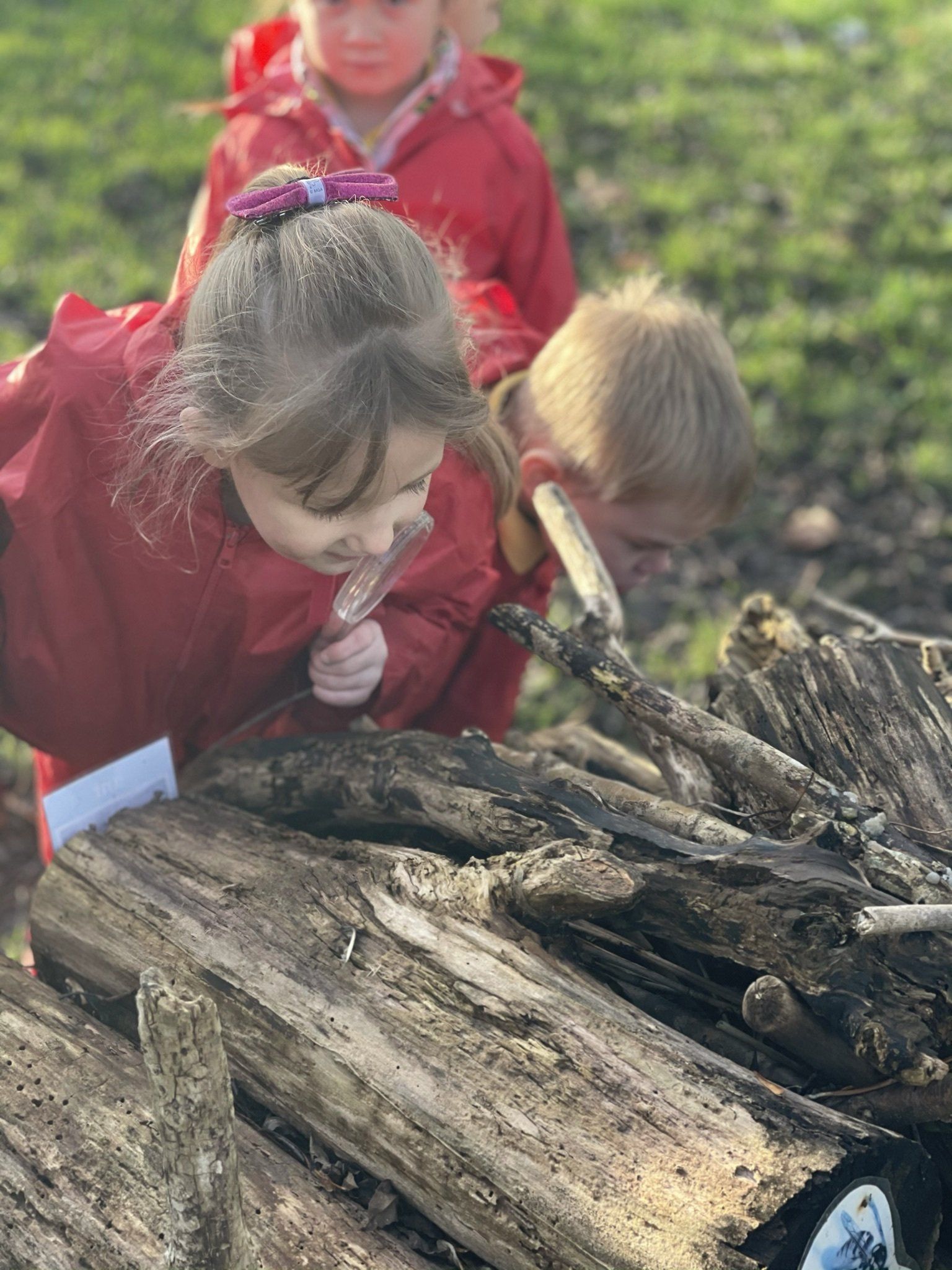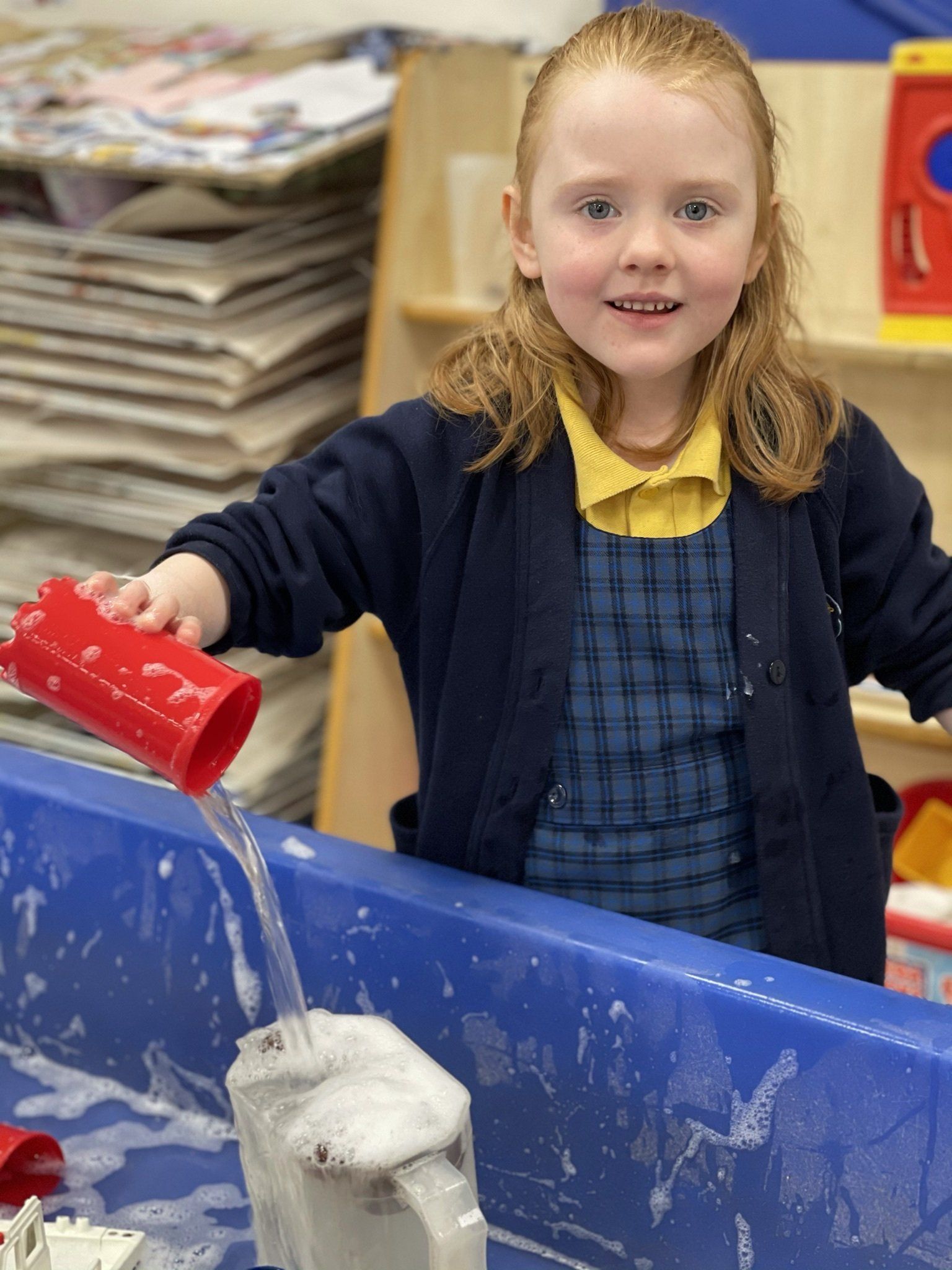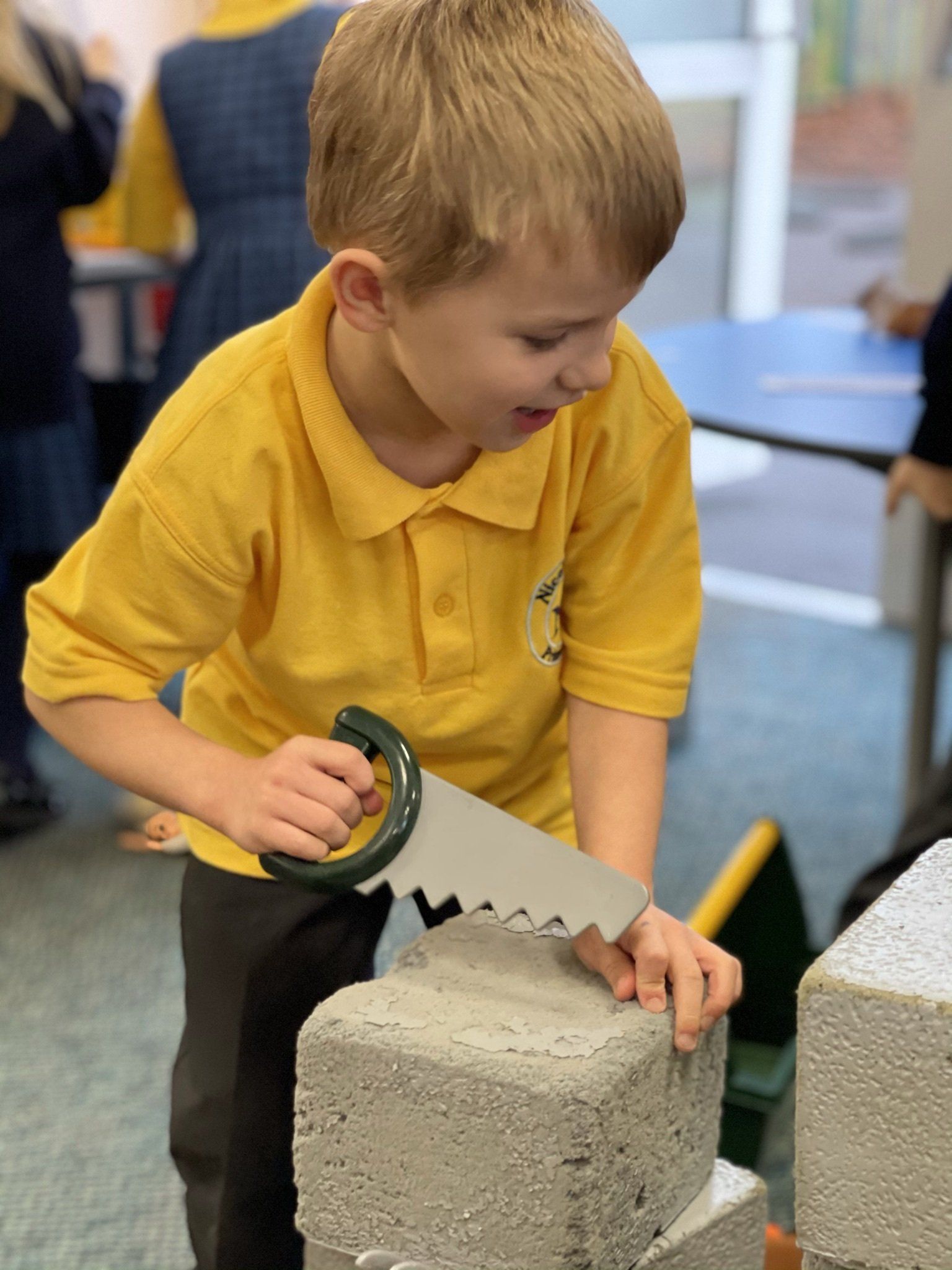NICOL MERE SCHOOL
EYFS
We aim to provide a safe and happy learning environment with a welcoming atmosphere that creates a sense of belonging for our Nicol Mere family. We believe that education should take part in a fully inclusive environment with equal opportunities where all children will learn tolerance and respect. Our school strives to be the centre of the local community. We want to open the doors for all our children whether they be academic, music, art or sport: there are many pathways we want to encourage our children to walk down. Every child will be taught to the highest levels of academic standards to enable them to reach their potential, and to prepare them in every way for their own learning journey.
In our Early Years Foundation Stage at Nicol Mere we pride ourselves in giving our children the best possible start to their school journey. We recognise every child as an individual and support them to reach their full potential and achieve excellent learning outcomes. Our dedicated team of Early Year’s Practitioners have high expectations and care deeply about the children in our school and form close relationships with children and families.
Intent
We aim to
- Inspire a love of learning.
- Ensure that all children feel happy, safe, valued, respected and included.
- Encourage children’s confidence, sense of responsibility and respect for all people.
- Develop children’s awareness of diversity in the community and respect of others values and customs.
- Provide children with opportunities to develop their physical, intellectual, language, emotional, social and creative skills.
- Work in partnership with families.
Implementation
-
Our Curriculum
Our Intent will be delivered through a broad, ambitious curriculum designed to promote a love of learning. To follow a child’s development throughout reception as well as the changing seasons and festivals in the year. We aim to promote our Nicol Mere family ethos in developing knowledge of our community and the children’s family history. It aims to teach the children how their environment compares to other places, cultures and environments in other parts of the world. We aim to promote a love and respect for nature in caring for animals and in the exploration of our wonderful outdoor area and forest.
All the topics have resources and activities ready to use in the enhanced provision, however we also follow children’s individual interests to enhance continuous provision. Topics are introduced with a good quality text as well as themed dress up days. Using books in this way teaches children that books and reading form the basis of all learning. This ambitious Early Year’s curriculum aims to teach all children the skills and knowledge in order that they reach the seventeen Early Learning Goals described in the Early Years Foundation Stage. We teach through a range of teaching methods including child-initiated learning in our provision, whole class teaching and guided group teaching. All activities planned encourage the characteristics of effective learning.
-
Personal, Social & Emotional Development
We strive to enable children to be safe, happy, confident individuals. We also encourage self-regulation as much as possible and introduce rules and boundaries through modelling good behaviour and reflection time. We teach the children the Nicol Mere School Learning Values. Children are able to get ‘dojo points’ for trying hard, listening carefully, being kind, teamwork and helping others. We use story books such as ‘The Colour Monster’ ‘Lucy’s Quarrel’ and ‘The Bear Who Wouldn’t Share’ to open conversations relating to feelings and values. Children are taught about healthy lifestyles including the importance of regular exercise and healthy eating, we have large planters in which children grow fruit and vegetables that they can eat. We use our topics to cook and taste healthy food as well as special extracurricular events such as ‘Superheroes Super Healthy Picnic Party’ and ‘Goldilocks’ Fruity Porridge Morning.’
-
Physical Development
Our stunning outdoor environment and expansive grounds enables us to make the most of the outdoors and we encourage children to play outside as much as possible, the children have wellies in school and we have wet weather clothing so they can access the outdoors no matter the weather. Our intention is that children learn how to take measured risks and they are given access to our large outdoor area and forest. We encourage children to learn about nature and look after their environment. Children have access to balance bikes to encourage core strength. They have a physical skills trolley that they independently access as well as equipment to make their own large scale obstacle courses using equipment that develop upper body strength as they move large resources such as tires. Den building equipment also develops gross motor skills as well as thinking skills. Our indoor environment is carefully set up to develop physical skills in different learning areas, for example our sand and water provision resources are carefully selected to develop progression in physical skills. We have a P.E session each week as well as yoga sessions.
-
Communication & Language
At Nicol Mere we have a language rich environment, our practitioners are always ready to listen, communicate, role-model, explain, demonstrate, question and encourage talk and new vocabulary. Our environment is designed to promote language, we have two role play areas; a home corner, for children to use and rehearse familiar language in a familiar space. Pictures of family are displayed in this area to encourage talk as well as a large mirror for children to see themselves when role playing. We also have a role play are linked to our topics to encourage new language. The two areas are next to each other so children can link the familiar setting with the not so familiar setting. Our library area is a cosy, welcoming space designed for children to use together to talk about the books that they read or to use our soft toy reading buddies again to encourage language. We enhance the classroom and outdoor garden area to reflect the topic learnt or children’s individual interests. Each topic encompasses enhancements to the learning environment, this helps children learn and use new vocabulary introduced through the topics.
During whole class teaching session’s, children are encouraged to listen and communicate appropriately. Children are given talk partners based on ability (higher level communicators partnered with children who need support in this area to encourage good role models, children are encouraged to ask questions and contribute to whole-class and group discussion whenever possible. Children who struggle to communicate are targeted in the provision and learning interventions such as the NELI program and Nurture Group are used when children lack confidence or do not have the age-appropriate skills.
-
Reading
We aim to teach children to read and develop a love of books as soon as they arrive at Nicol Mere School, and books are used to teach topics and to enhance our whole curriculum.
We follow the Letters and Sounds systematic approach to phonics. Phonics lessons are taught daily for twenty-five minutes every day in small ability groups. In addition to daily phonics, children take part in guided reading several times per week in small groups. Children who need extra help with phonics are targeted in the provision by key members of staff. Differentiated phonics activities are also set up in continuous provision. The children take home reading books based on the phonics phase being taught and are encouraged to read at home daily, books can be changed whenever parents request a new book. A short differentiated phonics activity is taken home each week as well as letters and sounds homework on Education city.
Teachers read stories to children from high quality age-appropriate texts at every available opportunity. These books are then used to enhance the learning environment and reading area. We have a reading shed in the outdoor area as well as a cosy reading area indoors.
-
Writing
We introduce writing straight away, and teach pre-cursive handwriting alongside the letters and sounds curriculum. Guided writing activities based on our topics are also taught in small groups. Children are also encouraged to write in all areas of provision with staff modelling writing for different purposes. The children are provided with a range of pencils, pens, and other media to encourage them to write as much as possible. We hope to inspire children to write independently after they have been introduced to writing skills in their guided writing sessions. We have a writing shed in the outdoor area as well as clipboards to encourage children to write in any area.
-
Mathematics
Children are taught mathematics through play based activities in continuous provision, guided group work and whole-class activities. We use maths enhancement activities in the different areas in the classroom, including the outdoors. Our maths curriculum is progressive; we focus on one number per week to develop a deep understanding of numbers to 10. Each morning at registration we focus on counting, days of the week, months of the year and seasons. Adults also encourage children to develop maths skills at every opportunity in continuous provision. Children who need extra help with mathematics are targeted in the provision by key members of staff. Numbers are very visible in our outdoor area including playground markings and large numbers and number lines.
-
Knowledge & Understanding of the World
We strive to give children knowledge about the world around them and the rest of the world. Science is taught through most of our topics. For example, we observe ice in our Arctic topic and investigate how ice melts and forms through real hands-on experiences. We are extremely fortunate to have our own forest were we are able to observe nature including our bug hotel. The children thoroughly enjoy our Ducklings topic, they have the opportunity to watch ducklings hatch and develop. We have an investigation area with enhancements to encourage curiosity about the world.
Geography is taught through our ‘Around the World’ topic, we look at our globe and maps and explore different the different cultures and environments and how they differ to ours. We also look at our own school environment and regularly make maps and treasure hunts in our outdoor area. We teach RE throughout the year including the celebrations of Christmas, Easter, Divali and Holi so children are introduced to different belief systems.
History is taught by looking at our own family history including special times. As we progress throughout the year photographs are placed on our learning journey timeline so that children can look back and use vocabulary related to the past. We look at toys from the past as well as historical figures such as Guy Fawkes and Neil Armstrong. Stories such as ‘Dogger’, ‘Lost in the Toy Museum’, ‘My Grandpa’ and ‘I am Neil Armstrong’ are used to develop knowledge of the past.
-
Expressive Art & Design
In our creative area, the children are taught how to safely use and explore a variety of materials, tools and techniques, experimenting with colour, design, texture, form and function. They independently mix their own paints and choose the materials that they need. Children are inspired by our topics. We have discreet music lessons once per week but children are also taught songs based on our topics and are encouraged to sing, dance and perform in our outdoor music and stage area. We also learn songs and perform a nativity show at Christmas.
-
Our Environment
Our high quality learning environment aims to support children’s emotional development as well as cognitive development. Neutral colour schemes are used to promote a calm environment with a family feeling. High quality, open ended, gender neutral resources are used to promote independence, imagination, problem solving, communication as well as enhancements to provide challenge. Each area has been carefully resourced based on common play behaviours to ensure that provision is progressive and enhancements are carefully planned. Display is used to further children’s learning or celebrate children’s learning. In the classrooms displays are clear and uncluttered with an emphasis on letters and sounds and maths. In continuous provision letters and sounds resources are at child height for access. Our outdoor environment supports opportunities for large scale play. We have large scale construction and den building, physical skills trolley, pods for role play, a mud kitchen, large story telling/song chair, obstacle course building, music area and forest. There is a reading and writing shed and large white boards. Outdoor provision is enhanced with large scale maths games.
-
Our Timetable
Our timetable changes throughout the year based on the needs of the children. Each day children have a 25 minute letters and sounds session taught in small groups. They also have daily whole class literacy and mathematics sessions followed by guided sessions. We have a daily story/song time and a weekly P.E, R.E, Music and Computing session. The timetable is designed to give the children long uninterrupted sessions in continuous provision.
-
Parental Engagement
We recognise the central importance of parents/carers as children’s first educators. We believe they have a significant role to play in the lifelong education of their child. We strive to create and maintain partnerships with parents/carers as we recognise that together, we can have a significant impact on a child’s learning. We welcome and actively encourage parents to participate confidently in their child’s education and care in numerous ways.
- Holding information evenings before the children start school;
- 1:1 meetings with parents prior to the children starting school to discuss their child’s interests and needs.
- ASQ questionnaires and readiness for school questionnaires filled in to record parental viewpoint.
- Being welcoming and approachable and having an open-door approach for parents to voice concerns/ask questions;
- Daily planner to communicate;
- Class dojo to celebrate excellent behaviour and academic success as well as a way to communicate;
- Autumn term parents evening to discuss how their child has settled and baseline results. Spring term parents evening to discuss progress. Summer term open evening to discuss transition to Year One.
- Valuing parents’ contributions to Tapestry learning journal;
- Inviting parents into school for workshops including reading, letters and sounds, home learning and mathematics;
- Inviting parents to watch their child in a letters and sounds session to show how we teach phonics and how they can support their child at home;
- Encouraging parents to read with their child at home and make comments in their reading record books;
- Providing a weekly ‘Ask me About’ sheet to inform parents of the learning that has taken place that week, how to extend the learning at home and what the children will be learning the following week;
- Providing weekly letters and sounds sheets to show parents the phonemes the children are working on and how to support the learning at home;
- Providing parents with an annual mid-year report and an end of year summary report detailing achievements and their child’s EYFS profile;
- We also draw on our links with the community to enrich children’s experiences by taking them on outings and inviting members of the community into our setting to talk about their lives, work and experiences.
-
Impact
All adults in the reception team have a key role in children’s learning and development. Therefore they have a deep understanding of each child’s ability, progression and how they learn. We have weekly reception team meetings to discuss planning, assessment and intervention needs. Targeted intervention for specific children is planned to be delivered through play based activities 1:1 or in small groups. Assessment is moderated within our Early Years Team, with Year One teachers, SLT and within the local authority. Some observations of children’s achievements are collated in their own personal, online ‘Tapestry’ Learning Journal, however we recognise that ‘Assessment should not entail prolonged breaks from interaction with children’ (Statutory Framework for the Early Years Foundation Stage) therefore this will only include new learning. Parents can add to the online journal and see the outstanding progression that their child makes throughout their time in reception. This outstanding progress can also be seen in their learning journey files that contain independent work and their guided writing books.
Our children will develop a love of learning and feel happy, safe, valued, respected and included. Children will be confident with a sense of responsibility and respect for all people. They will have an awareness of diversity in the community and respect of others values and customs. They will develop physically, intellectually, emotionally, socially and creatively and reach their potential in being ready to continue their journey through Nicol Mere school.
ABOUT US
Any queries can be answered by Mrs Pugh, our senior administrator.
Any SENDs queries can be answered by Miss Norris, our SENDco, using the contact details given.
Please note: If you require a paper copy of the any of the information on the website, you can request this from the school office. Requests may take up to 10 working days.
CONTACT US
Tel: 01942 720871
E-mail: enquiries@admin.nicolmere.wigan.sch.uk




